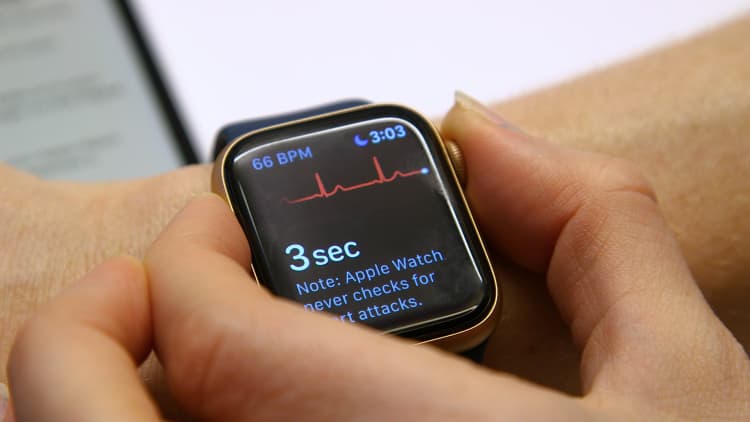Apple has dozens of medical doctors working across its various teams, say two people familiar with the company's hiring, showing how serious it is about health tech.
The hires could help Apple win over doctors — potentially its harshest critics — as it seeks to develop and integrate health technologies into the Apple Watch, iPad and iPhone. It also suggests that Apple will build applications that can help people with serious medical problems, and not just cater to the "worried well," as many have speculated.
These hires are not just for show, according to people familiar with the doctors and their roles. Many haven't disclosed their role at Apple at all, which is commonplace at a company that prides itself on secrecy. One example is Stanford pediatrician Rajiv Kumar, who has worked there for several years. CNBC was able to locate 20 physicians at Apple via LinkedIn searches and sources familiar, and other people said as many as 50 doctors work there. Apple has more than 130,000 employees globally.

Other tech companies also employ doctors. A LinkedIn search revealed a handful at Amazon — the most notable are cardiologist Maulik Majmudar and family physician Ben Green — and more than a dozen across Alphabet, with the biggest chunk at Verily (its life sciences arm), Brain (its AI research group) and the venture investing groups. However, the actual number of doctors at these companies may be higher, depending on how strict they are about confidentiality.
Apple declined to comment on personnel matters.
Managing disease
The number of doctors on staff is an indication that Apple is serious about helping customers manage disease, and not just wellness or fitness.
For instance, the company hired an orthopedic surgeon, Sharat Kusuma, to manage its partnership with medical device maker Zimmer Biomet to study whether Apple technology can help patients recover from knee and hip replacement surgeries. Kusuma's LinkedIn profile states that he's leading that particular team.
Doctors can also help Apple guide the medical community on how to use Apple's new health technologies and to deflect criticism. As an example, when Apple announced its electrocardiogram sensor to track heart rhythm irregularities, the company put up a website to help answer physicians' questions. That's important because there's a very high bar to win approval among doctors who fear liability and are already overburdened by technology.
The doctors at Apple aren't in one singular group but are spread out across the organization.
Many are working on Apple Watch, which has a variety of different product groups focusing on health sensors (several teams contain an embedded doctor, according to people familiar). Some are on the health records group, helping develop the company's software to aggregate patient medical information and store it securely, and others are doing research and development work. There's also been a recent spate of hires into Apple's AC Wellness primary care group, which treats employees near its headquarters. Some of these folks come from Crossover Health, which Apple contracts with to provide health care to employees in other locations.
In addition, several of these doctors have the ear of top execs at the company.
Sumbul Desai, a doctor that Apple hired from Stanford Medicine, is a top leader in the health group who works closely with the company's COO Jeff Williams, according to several insiders. Bud Tribble, another doctor, is a vice president of software at Apple and an original member of the Macintosh design team. Other notable MDs are Mike Evans, a family medicine doctor on the special projects team, and Michael O'Reilly, an anesthesiologist who's been at Apple for almost six years.
Many of these doctors, including Desai, are also still continuing to see patients. That might also give Apple an edge by emphasizing the patient experience.



